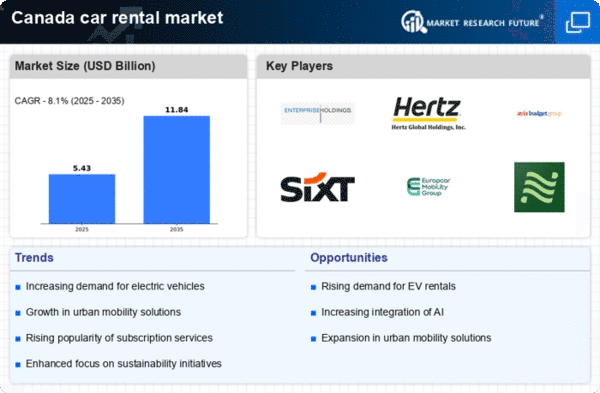Tourism Growth
Tourism in Canada is experiencing a notable resurgence, which is likely to bolster the car rental market. In 2025, the Canadian tourism sector is expected to generate over $100 billion in revenue, with a substantial portion attributed to car rentals. Tourists often seek the convenience of rental vehicles to explore diverse landscapes and attractions across the country. This trend suggests that rental companies may need to adapt their services to accommodate the influx of visitors, potentially leading to increased competition and innovation within the car rental market.
Rising Urbanization
The ongoing trend of urbanization in Canada appears to be a significant driver for the car rental market. As more individuals migrate to urban centers, the demand for rental vehicles increases, particularly for short-term use. Urban residents often prefer renting over owning due to limited parking and high ownership costs. In 2025, urban areas are projected to house approximately 81% of Canada's population, which could lead to a heightened reliance on rental services. This shift may encourage rental companies to expand their fleets and diversify their offerings to cater to urban dwellers, thereby enhancing the overall car rental market.
Technological Integration
The integration of advanced technology in the car rental market is transforming the way consumers interact with rental services. Innovations such as mobile apps, contactless rentals, and real-time vehicle tracking are becoming increasingly prevalent. In 2025, it is anticipated that 60% of rental transactions will occur through digital platforms, indicating a shift towards a more tech-savvy consumer base. This technological evolution may compel rental companies to invest in digital infrastructure and enhance user experiences, thereby shaping the future of the car rental market.
Sustainability Initiatives
The growing emphasis on sustainability in Canada is influencing consumer preferences, which may drive the car rental market towards eco-friendly options. As environmental awareness increases, rental companies are likely to expand their fleets to include hybrid and electric vehicles. In 2025, it is estimated that 25% of new car rentals will be electric, reflecting a shift towards greener alternatives. This trend suggests that the car rental market must adapt to meet the evolving expectations of environmentally conscious consumers, potentially leading to innovative business models and partnerships.
Corporate Travel Resurgence
The corporate travel sector in Canada is witnessing a revival, which could positively impact the car rental market. As businesses resume travel for meetings and conferences, the demand for rental vehicles is likely to rise. In 2025, corporate travel spending is projected to reach $30 billion, with a significant share allocated to transportation services. This resurgence may prompt rental companies to enhance their corporate offerings, including tailored packages and loyalty programs, thereby strengthening their position within the car rental market.

















